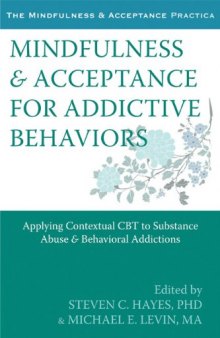 جزییات کتاب
جزییات کتاب
As a clinician or researcher in the field of mental health or addictions, this book will offer you powerful insight into how acceptance and mindfulness-based interventions are being successfully used to treat a variety of addictive behaviors, ranging from substance abuse to gambling addiction. Edited by Steven C. Hayes, a founder of acceptance and commitment therapy (ACT) and a world renowned authority on mindfulness-based therapy, Mindfulness and Acceptance for Addictive Behaviors features chapters by leading substance abuse and addiction researchers. Each article illuminates the mindfulness and acceptance-based treatments that work best for particular addictive behaviors, reviews empirical data, and discusses future directions for research and treatment applications. An essential resource for mental health and addictions professionals, researchers, and students interested in the most effective treatments for addiction, this book will dramatically impact the way addictions of all kinds are viewed and addressed in therapy. In this book, you will learn to apply mindfulness and acceptance to help patients with: Alcoholism Substance abuse Smoking cessation Gambling addiction Pornography addiction Binge eating Detoxification Self-stigma and shame The Mindfulness and Acceptance Practica Series As mindfulness and acceptance-based therapies gain momentum in the field of mental health, it is increasingly important for professionals to understand the full range of their applications. To keep up with the growing demand for authoritative resources on these treatments, The Mindfulness and Acceptance Practica Series was created. These edited books cover a range of evidence-based treatments, such as acceptance and commitment therapy (ACT), cognitive behavioral therapy (CBT), compassion-focused therapy (CFT), dialectical behavioral therapy (DBT), and mindfulness-based stress reduction (MBSR) therapy. Incorporating new research in the field of psychology, these books are powerful tools for mental health clinicians, researchers, advanced students, and anyone interested in the growth of mindfulness and acceptance strategies.



 دانلود کتاب
دانلود کتاب

 جزییات کتاب
جزییات کتاب





 این کتاب رو مطالعه کردید؟ نظر شما چیست؟
این کتاب رو مطالعه کردید؟ نظر شما چیست؟
